
This Wealthy Affiliate review covers everything you need to know to make an informed decision, before you choose a platform to start your online business.
There are many ways to make money online. Affiliate marketing is one of the most popular ones due to the lure of quick and easy money.
Unfortunately, there’s no shortage of companies making that bold promise — and not only in their marketing. They bake these promises right into their product offerings. Wealthy Affiliate is one such company.
Why would we review Wealthy Affiliate?
You may be wondering about the motivations behind this Wealthy Affiliate review. We wanted to discover if the product behind the hundreds of online “reviews” lived up to the hype.
This in-depth analysis will answer four basic questions:
Is Wealthy Affiliate legit?
Can it prove that it offers a great set of tools to help solopreneurs?
Does Wealthy Affiliate offer good value?
But most importantly…
Is the Wealthy Affiliate platform an effective way to build an honest to goodness, long-lasting online business?
Or is it all just marketing hype intended to make money for Wealthy Affiliate?
Full Disclosure
We created this review of Wealthy Affiliate as part of a much larger investigation of the online business space. It’s the first of a series of in-depth studies on the “State of Solopreneurship.”
Hundreds of reviews compare Wealthy Affiliate to our product, Solo Build It!, and claim superiority, with no proof. These fake reviews nudged us to study the entire online business space in a no-nonsense, accurate, fully reproducible way.
And so we did. Download the Whitepaper if you’d like to review the results of this unique study. You could even reproduce the study yourself.
As of this writing, not one of the results, methodologies or conclusions has been credibly challenged or disputed.
This review of Wealthy Affiliate focuses on one thing — the only thing that should matter to a person looking to build a business — results.
Not the results or success of Wealthy Affiliate, the company — but the results and likelihood of success for Wealthy Affiliate’s customers.
What Is Wealthy Affiliate?
Wealthy Affiliate’s website describes its product as “A Platform Designed For Affiliate Marketers Of All Levels” where you “Transform Your Ideas Into Profits,” “Build Beautiful Websites” using “Proven Strategies to Attract Loads of Traffic.” It claims that “Your Revenue Sources Are Unlimited.”
The Pitch: Wealthy Affiliate’s Marketing
 The site has a “live” scroll of activity occurring in the Wealthy Affiliate community. You can see people joining, newbies asking questions, their questions being answered, and lots of busywork being done. According to this scroll, there are people joining and “just created my first website” every other second.
The site has a “live” scroll of activity occurring in the Wealthy Affiliate community. You can see people joining, newbies asking questions, their questions being answered, and lots of busywork being done. According to this scroll, there are people joining and “just created my first website” every other second.
Other headlines from the marketing site claim that the average time it takes to build a website is… wait for it… 34 seconds!
“A website that used to take weeks and months to build can now be done in a blink of an eye.”
Sorry for the sarcastic tone. After 20 years of helping people build successful online businesses, we know that “free-and-easy” is a common marketing term used to relieve worry about a product’s technical shortcomings.
Wealthy Affiliate’s claims — and there are many unsubstantiated, impossible-to-verify claims on its marketing pages — try to distract the would-be business builder, hoping they’ll focus on all the wrong things.
Building a website in 2019 is much easier than it used to be. You could, if you wanted to, choose the first template you see, select your business name, and click a button in 34 seconds. But that is not creating a website. More importantly, it has no relationship to building a long-term successful web business.
That deception was the first red flag.
The Goods: What You Get
Wealthy Affiliate’s business model is a common two-tiered system — free and “Premium.”
Free membership grants you:
- Basic training
- A limited dashboard, and limited community access
- Live help for 7 days
- 2 “websites,” which are subdomains, e.g., subdomain.siterubix.com (siterubix is the Wealthy Affiliate domain name used to build all customer sites)
- Limited use (30 searches) of their keyword research tool
Like most “freemium” product offerings, the free version of the product is essentially an upsell, for you to have a look around, try a few things, and get a feel for the product. And that would be fine except for the claims in the Wealthy Affiliate affiliate training program that the “free offering is better than paid programs.”
The reality is that you have a near-zero chance of receiving traffic to your site when it uses a free subdomain. And without traffic, there’s no successful business.
The Premium version costs $49 a month, which includes:
- 50(!) websites
- Live help
- Private messaging
- A website security package
- Website backup
- Access to all beginner training videos and courses
- Unlimited searches using the Keyword Research tool
- 1 to 1 coaching
- Access to webinars
- 24/7 website support
- Website feedback and a comment platform
- Website analytics
These types of “tools” and offerings are not uncommon in the “make-money-online” space. Wealthy Affiliate pushes it to new red-flag lows.
Is Wealthy Affiliate Legit?
 The “Success” section of the website makes vague comments, such as “There are 1,000’s of people succeeding every day within Wealthy Affiliate.” But there’s no way for the reader to verify that claim of success, nor does Wealthy Affiliate provide any…
The “Success” section of the website makes vague comments, such as “There are 1,000’s of people succeeding every day within Wealthy Affiliate.” But there’s no way for the reader to verify that claim of success, nor does Wealthy Affiliate provide any…
- There’s no mention of a single successful client.
- Its “forums” do not display domain names.
- Affiliate “reviews” talk about success, too, but offer no verifiable proof.
Providing domain names is the simplest way to enable verification of claims. The reader can check ballpark traffic by using free tools like Alexa, SimilarWeb and SEMrush. With these tools, you can verify the only thing that can show even a semblance of success — website visitor traffic.
A fake review can be defined as a positive, neutral or negative review that is not an actual consumer’s honest and impartial opinion or that does not reflect a consumer’s genuine experience of a product, service or business.European Parliamentary Research Service, 2015
Can Wealthy Affiliate Prove That it Offers a Great Set of Tools to Help Solopreneurs?
 Doing a simple Google search found many reviews on Wealthy Affiliate, with identical “success” lists, formatted in almost identical ways.
Doing a simple Google search found many reviews on Wealthy Affiliate, with identical “success” lists, formatted in almost identical ways.
The Wealthy Affiliate blog has many claims. There’s a constant stream of stories from its customers — from “$3,700 in one day” to “Sold a Website for 40K.”
Reading these blog posts reveals the formula that Wealthy Affiliate has not only used — but devised, recommends, and teaches.
Most of these “success” posts make vague claims without any proof (a domain name, for example). Dozens of “customers” reply in the discussion part of the posts, congratulating each claim of success — with very (very!) similar comments about how motivating, inspirational and reassuring the post was, complete with how wonderful Wealthy Affiliate is, that if you just stick with it, “you can too.”
Any requests by curious visitors or members lead to answers like, “Unfortunately I won’t be giving out my domain name, but I can assure you that the earnings are real. And it’s $17K in a week. I have no reason to lie about this.”
The profiles of the people making these claims offer no further proof. There are no domain names to verify. For the few that have social links, we found examples of very anemic activity — few followers, no engagement, and hardly any posts.
It’s possible that some of these claims are true. But the fact remains that Wealthy Affiliate, through its training and guidance, does not provide any way for a potential customer, or even a member, to verify them.
We could go through every claim of all those “reviews” and debate them in detail, showing how they range from flat-out lies to honest mistakes (and everything in between).
Why bother? There’s a more effective way to verify their claims.
Is Wealthy Affiliate Worth It? Let’s Study Their Customers
 No business can succeed without customers. A bricks-and-mortar business needs walk-in traffic. An online business needs the online equivalent — visitors to its website.
No business can succeed without customers. A bricks-and-mortar business needs walk-in traffic. An online business needs the online equivalent — visitors to its website.
With no visitors, your web business will not succeed. It’s that simple.
This basic requirement (traffic) makes it possible to compare companies like Wealthy Affiliate, GoDaddy, Wix, WordPress, Squarespace and our own Solo Build It!. Each company, in one way or another, makes marketing claims about its product.
The goal of this study was to determine which product(s) enable solopreneurs to build profitable online businesses. We looked for big picture, conclusive, meaningful differences.
For example:
Does one product make a solopreneur significantly more likely to succeed than another?
A result that shows Wealthy Affiliate makes a solopreneur 250% more likely to succeed would be meaningful.
50% more likely to succeed would be suggestive.
A 5% difference? Meaningless.
We also looked for big differences in the levels of success. There’s little difference between a site with a traffic ranking of 900,000 and one that ranks 1,000,000 at SimilarWeb, for example.
However, both of those sites are much better than sites with a ranking of 10,000,000. Similarly, a site inside of 100,000 (which is rare for solopreneurs) is a significantly bigger success than one at 1,000,000 (which itself is excellent).
For this reason, the definition of success we used is based on ballpark traffic estimates. Any site that ranks in the Top 1,000,000 at Alexa or SimilarWeb (SW) is in an excellent ballpark.
So, if Wealthy Affiliate placed 3 times more solopreneurs into a high-traffic ballpark (e.g., <1,000,000 at Alexa — aka “Top 1M”) than Solo Build It!, that is significant. A 10% difference is virtually meaningless.
The definition of failure, too, is based on ballpark traffic estimates. A site with a traffic ranking of 30,000,000 at Alexa (or SW) has significantly less traffic than, say, a site with a ranking of 1,000,000.
Finally, what’s the pattern of the difference from most successful to least? If one product has a definite edge over the other, a clear pattern should emerge from the best performance level to the worst.
Note: We used Solo Build It! as the comparison baseline for two reasons:
- We could directly cross-check traffic numbers of our customers to ensure accuracy.
- Wealthy Affiliate has claimed that it possesses a “better” method for solopreneurs to succeed.
Review the Results
As mentioned, this review is based not on claims, but on a rigorous, verifiable, reproducible study, conducted on Wealthy Affiliate as well as other popular web hosting and site-building companies.
We’ve summarized all the results here, so that you can compare and gain perspective on how each of these companies’ customers actually rank.
Again, if you enjoy looking at data (as we do!), download the full study results.
How to read the results
In the bar chart below, you see a breakdown summary that covers all of the traffic ranges:
- from the highest success (0-100K Alexa rank — extremely difficult for a solopreneur to achieve)
- to the worst failure (>30,000,000 Alexa rank — virtually no traffic)
See the red and blue “Bar Couplets” in the charts below? There’s one Bar Couplet for each range of Alexa traffic ranking.
Each couplet is a percentage, and the two add up to 100%. Each couplet, therefore, shows how much of each traffic range (e.g., 0-100K) is contributed by SBI! sites and how much by WA sites.
The blue bar represents SBI!. Wealthy Affiliate is red.
LET'S COMPARE!
Wix / GoDaddy / Wealthy Affiliate / WordPress / Squarespace vs. Solo Build It!
As we complete each study, it's helpful to compare the results to all previous studies as there are new conclusions that can be reached.
For reference, here are the key charts:
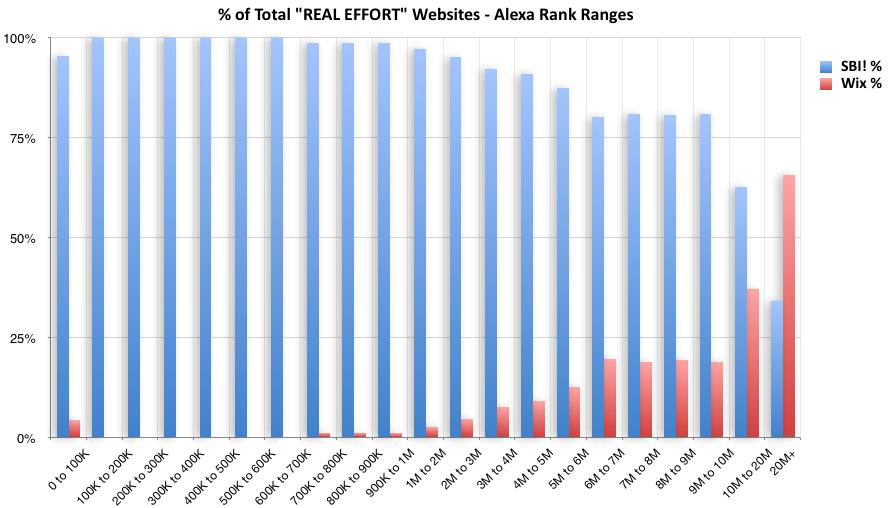
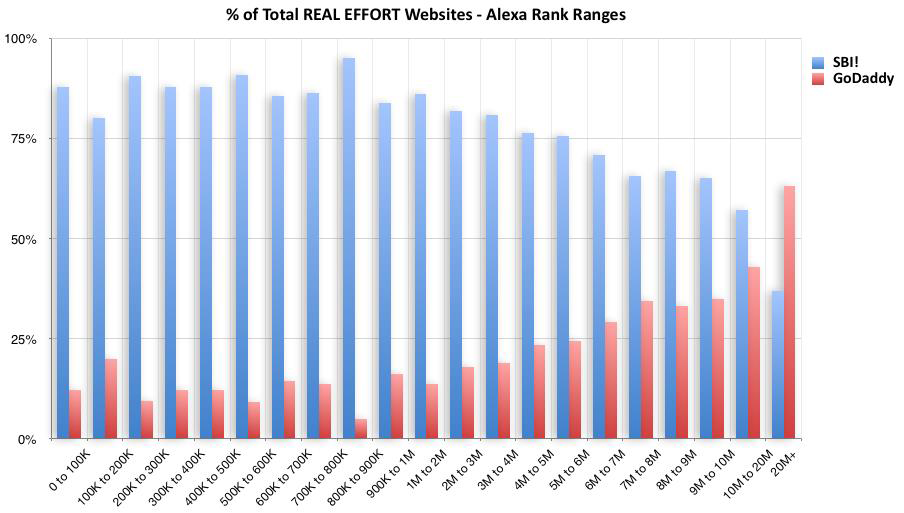
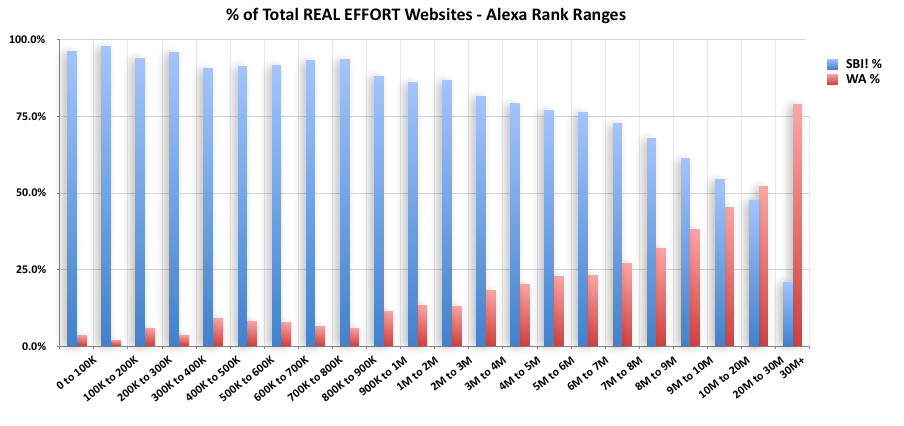


These comparisons detail the percentage of each platform’s sites within the Alexa traffic ranges. The lower the Alexa traffic range, the higher is the website's traffic.
Clearly, choosing Solo Build It! means that your chances of building a successful site that drives serious traffic are significantly higher than if you use Wix, GoDaddy, Wealthy Affiliate, WordPress or Squarespace.
Triple-checked
The following three charts compare SBI! to Wealthy Affiliate using Alexa, SimilarWeb and SEMRush, and are uncorrected for the 70% difference in the amount of websites sampled (Wealthy Affiliate has approximately 17,000 active, hosted sites while Solo Build It! has approximately 10,000).
As you can clearly see, the results validate across the three traffic-measuring services.
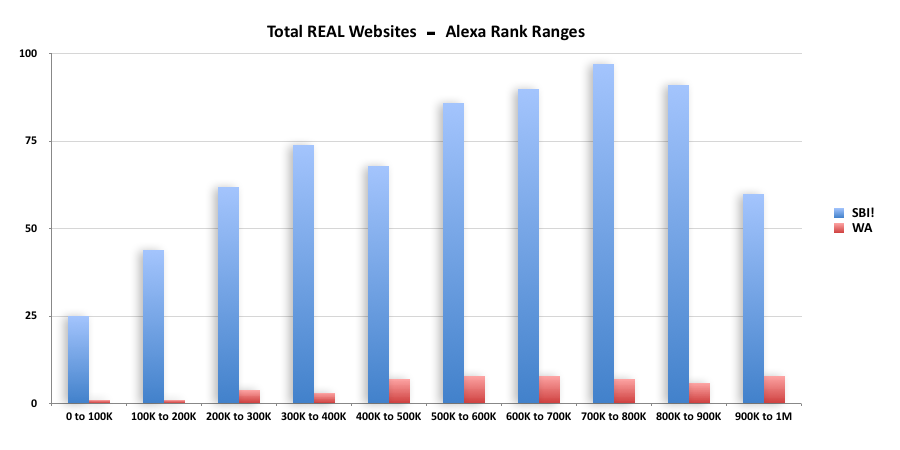
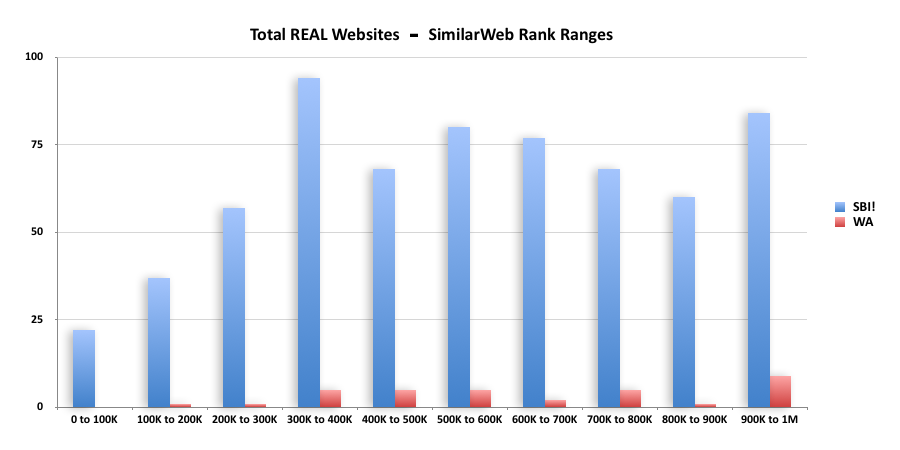
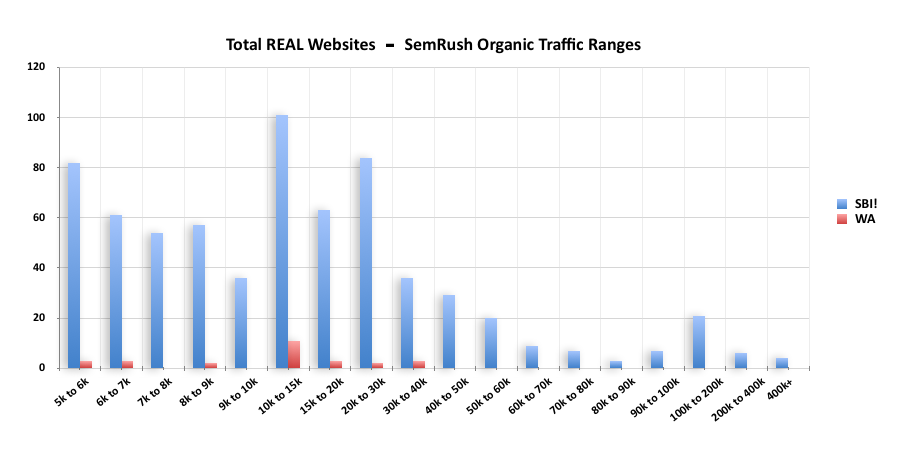
Not into numbers?
Here’s what the study found:
SBI! Sites are 33 times (33X) more likely to achieve “Outstanding – Excellent” levels of traffic than Wealthy Affiliate.
SBI! Sites are 10 times (10X) more likely to achieve “Medium” levels of traffic than Wealthy Affiliate.
The only category where Wealthy Affiliate “beats” SBI! is in the worst level of failure, “Invisible” (i.e., they get no detectable traffic).
87% of Wealthy Affiliate sites are “Invisible.”
The superiority of SBI! is so high that these results will seem unbelievable to some. To be assured, we repeated the study one month later with near-identical results.
And finally, in case you have doubts about using Alexa rank for comparison, we cross-checked and validated these results with SimilarWeb and SEMRush.
All three of the traffic measuring services we used yielded the same conclusions. Again, we invite others to repeat these tests, too.
Wealthy Affiliate Review: The Conclusion
There’s nothing particularly unique about starting, maintaining and succeeding with an affiliate marketing business. Like all businesses (online and off), it takes careful planning, good decision-making, and the proper tools, strategies and guidance.
The decision on which company to invest your time and effort is vitally important.
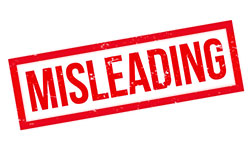 Unfortunately for those who want to make a genuine effort at building an online business, too many companies try to distract with common commodities, like the ability to build a “stunning website.” Some even deceive.
Unfortunately for those who want to make a genuine effort at building an online business, too many companies try to distract with common commodities, like the ability to build a “stunning website.” Some even deceive.
There’s no stronger indicator, and no better way of evaluating potential success, than website traffic. The results above speak for themselves.
Wealthy Affiliate goes to great lengths to convince visitors that its product is the best. Our research revealed how far it goes. Its deception runs deep.
Its marketing pages promote, without proof, that Wealthy Affiliate is the best:
- They convince affiliates that they’re doing their visitors “a service” by recommending WA.
- They convince “freemium” customers to convert to the paid version, at $49 per month.
This leads us to believe that Wealthy Affiliate has concocted an elaborate circular system and training program that turns its affiliate program into a “fake review machine.”
Promoting Wealthy Affiliate is the Business Model
This “buy a make-money system to sell that make-money system” turns customers into affiliates who replicate the process.
Compare this to the huge variety of niches where Solo Build It! customers build their businesses. These solopreneurs find purpose and make money online.
Wealthy Affiliate may know (from its own numbers) how poorly its clients do. The owners may even realize that they were giving affiliates justification to create misleading reviews.
So how do they get so many people to support (what we believe to be) a poor-performing product without proving success?
The answer is a testament to the goodness of people — we tend to believe what’s written. There’s also power in false repetition.
Wealthy Affiliate’s “training” materials repeatedly assure affiliates that its product is the best — over and over again until the affiliates believe it.
Wealthy Affiliate preaches success (without proving it). It delivers failure (per the study we performed). There’s near-zero real success (just 53 sites in the Alexa Top 1M, out of almost 17,000 active sites).
All of this is good for the company, but bad for its customers.
So, let’s circle back to the most important question we asked in the beginning:
Is the Wealthy Affiliate platform an effective way to build an honest to goodness, long-lasting online business?
 No, it’s not. In fact, it’s a shame that their business model has cost people so much money, and so much of their irreplaceable time.
No, it’s not. In fact, it’s a shame that their business model has cost people so much money, and so much of their irreplaceable time.
We hope that you’ll protect your money and time by looking at the most important proof when choosing a company to empower your online business:
Proven. Verifiable. Results.
Don’t start your business without them!


